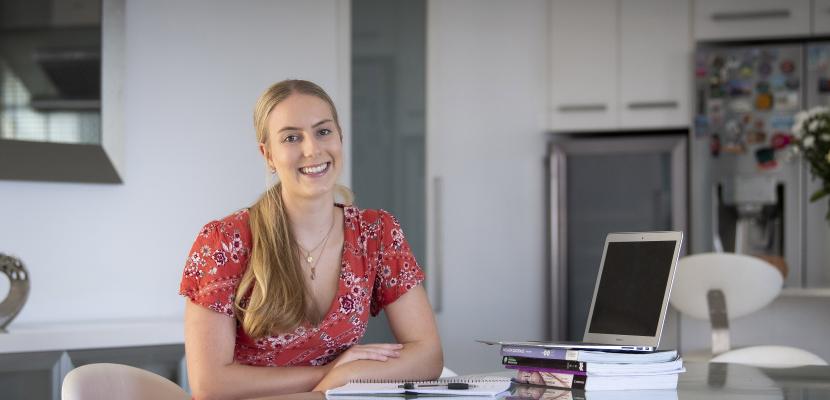
Year 12 student Rose Hackett says the resilience she has developed this year will help her in the jobs market. Picture: Cavan Flynn.
by Jessica Borten
The Class of COVID endured disrupted studies and will finish Year 12 amid a recession but a leading psychologist says they will be more employable than previous cohorts.
Bond University Associate Professor Peta Stapleton said the turmoil of 2020 would give graduates qualities such as resilience and flexibility which were sought-after in the workplace.
“It’s that ability to be resilient in the face of adversity which was COVID,” Dr Stapleton said.
“I think that resilience or hardiness that may have needed to be drawn upon is going to make them stand out. They’ve had to be flexible; they had no choice.
“They’re really good skills that you don’t necessarily teach in a classroom.”
Dr Stapleton said seniors should ‘find the silver lining’ and use this year to their advantage when job hunting in the future.
“I think if they can demonstrate a mindset of what they took out of it rather than the stress that they had to cope with, that’s going to really stand out in the workplace,” Dr Stapleton said.
“I think that is going to be a stand-out trait that other people won’t be able to offer.”
Bond University Career Development Centre Director and Beyond Bond Convener, Kirsty Mitchell, said the students most likely to thrive in the jobs market were those who saw the challenges of 2020 as opportunities to learn.
“(Grade 12 students) have had no choice but to adapt to new ways of working, doing and being in their final year of school and still maintain progress around their studies,” Ms Mitchell said.
“Students who see adversity as challenge sit in the discomfort, then work out how to make the best of it and adapt. They also seek out learning and reflection to support this.
“So, for these students, their employability will be enhanced as this disruption will not be the last in their long careers.
“Learning this early will help them not to take things for granted, build skills and resilience around change and then be able to pivot for the next one.”
Rose Hackett, a Year 12 student at A. B. Paterson College, said online learning was the most challenging part of this year but agreed she and her peers were more resilient after the trials of 2020.
“Completing Year 12 is already difficult in itself but also being the first cohort to complete the ATAR system is challenging, and then to throw in a pandemic just takes everything to a whole new level of difficulty,” Ms Hackett said.
“I think that I will be more employable as a graduate of 2020 as we as students have learnt to be resilient in a whole new aspect.
“We have developed coping mechanisms and ways to think outside of the box, not to mention our increased ability to work with technology as we would have been unable to learn without it.
“I do believe that I will be well equipped for my future no matter what is thrown at me.”

